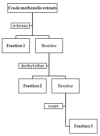Julbernardia paniculata and Pterocarpus angolensis: From Ethnobotanical Surveys to Phytochemical Characterization and Bioactivities Evaluation
- PMID: 32316213
- PMCID: PMC7221604
- DOI: 10.3390/molecules25081828
Julbernardia paniculata and Pterocarpus angolensis: From Ethnobotanical Surveys to Phytochemical Characterization and Bioactivities Evaluation
Abstract
Julbernardia paniculata and Pterocarpus angolensis are two plant species with important application in African traditional medicine, particularly in Angola, in the treatment of several diseases. However, scientific studies concerning these species are scarce. The goal of this work was to know better which medicinal approaches are used by the Huíla population in Angola by means of ethnobotanical surveys. Furthermore, extracts of both plants were phytochemically characterized. Antioxidant, anti-inflammatory, wound-healing activities, and potential cytotoxicity were also studied. With this study it was possible to verify that 67% of the individuals that use medicinal plants are women, and their main therapeutic uses are the treatment of problems of the digestive system and skin disorders. Barks of J. paniculata and leaves of P. angolensis are the most often used plant parts. Through high-performance liquid chromatography coupled to diode-array detector (HPLC-DAD) and GC-MS it was possible to characterize the chemical composition of the two species, which are rich in phenolic compounds, terpenes, terpenoids, sesquiterpenoids and fatty acids. Both plants showed to possess antioxidant, anti-inflammatory proprieties, and wound-healing activity. To the best of our knowledge, this is the most comprehensive study of these two species and the first ethnobotanical and ethnopharmacological study of medicinal plants from this region of Angola.
Keywords: GC-MS; HPLC-DAD; Julbernardia paniculata; Pterocarpus angolensis; ethnobotanical surveys; phytochemicals; wound-healing activity.
Conflict of interest statement
The authors declare no conflict of interest.
Figures



References
MeSH terms
Substances
Grants and funding
LinkOut - more resources
Full Text Sources
Medical
Miscellaneous

